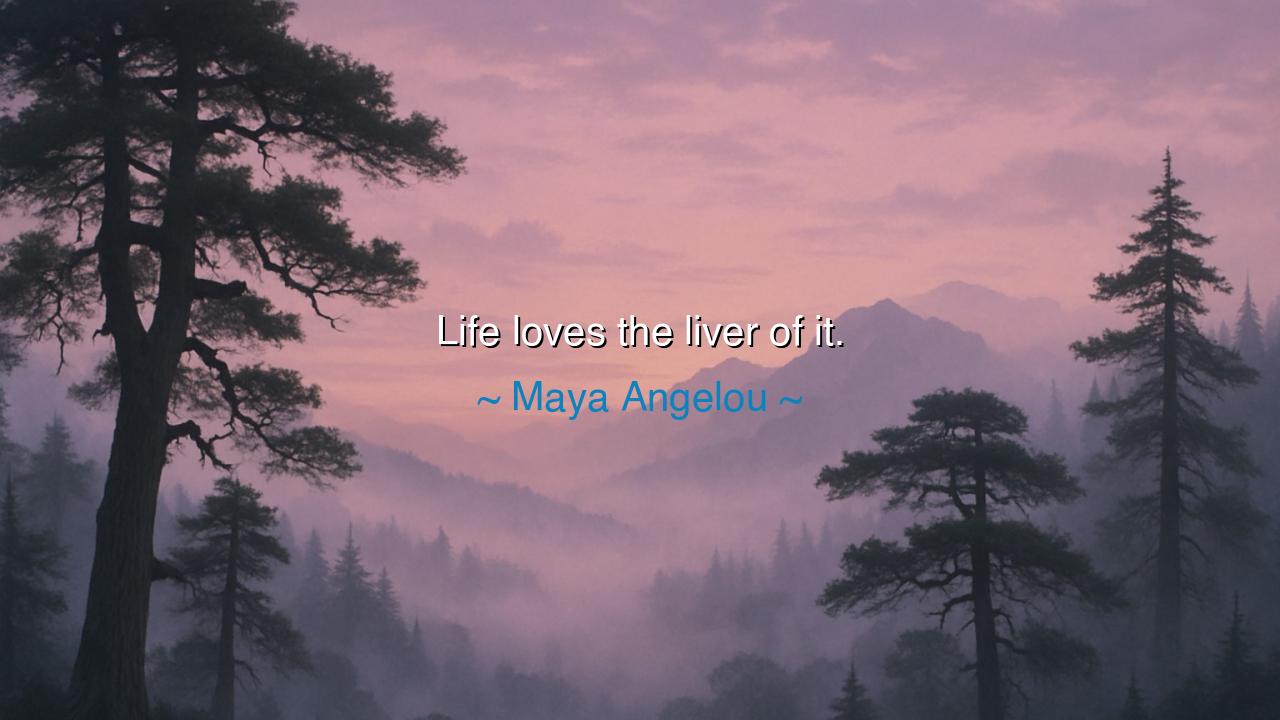
Life loves the liver of it.






"Life loves the liver of it." – Maya Angelou.
In these beautifully succinct words, Maya Angelou invites us to understand life as a vibrant, full-bodied experience that demands vitality, engagement, and the living of life to its fullest. The phrase "the liver of it" is rich with symbolism. The liver is a vital organ, responsible for filtering and cleansing the body, ensuring that we remain healthy and energized. To live fully, Angelou seems to suggest, is not merely to exist passively or to go through the motions, but to embrace life’s challenges and pleasures with reckless abandon, with a full heart and spirit. It is in this wholehearted living that life thrives and flourishes.
The ancient philosophers often spoke of living in alignment with the natural forces of life, urging humanity to embrace all aspects of existence—both the joyful and the painful. Aristotle spoke of living the good life through the pursuit of virtue and balance, and how that balance was to be found in the active participation in life’s affairs, not in the avoidance of discomfort or hardship. To him, the good life was not about escaping the rough patches, but about embracing them and using them as fuel for personal growth and understanding. Angelou’s words echo this sentiment—life, in all its messiness and chaos, loves those who dive into it fully, rather than those who seek to retreat or remain stagnant.
The great adventurers and explorers of history—figures like Marco Polo, Christopher Columbus, and Amelia Earhart—understood the necessity of living boldly. They were driven not by the desire to merely exist, but to experience the world, to challenge themselves, and to test the limits of their own courage. Take the example of Earhart, whose flights symbolized the pursuit of freedom, exploration, and defiance of the conventional limits of her time. Her courage to fly into the unknown embodied the spirit of embracing life’s potential in the way that Angelou describes. Life loved her boldness, her risk-taking, and her determination to live fully.
Similarly, Frida Kahlo, the Mexican artist, exemplifies this approach to life. Despite enduring immense physical pain throughout her life from a debilitating injury, Kahlo transformed her suffering into a work of art, allowing the vibrancy of life to pulse through her creations. Her work was not just about creating beauty, but about fully living through the expression of her own pain, joy, and identity. Kahlo’s very existence was a celebration of life, one that embraced suffering as much as it embraced joy. Her life’s motto seemed to be that life loves the liver of it—to live fully, in all its complexity and richness.
In these examples, we see that life is not about passively waiting for circumstances to unfold or avoiding difficulties. It is, as Angelou suggests, about the active engagement with the world around us, about embracing every part of the experience, no matter how hard or joyous. Living life to the fullest means choosing to experience everything it has to offer, including the struggles, the setbacks, and the moments of vulnerability. In each of these challenges, there is growth—a deepening of understanding, a sharpening of character, and a more profound connection to the world and to the self.
The lesson from Angelou’s quote is clear: life is meant to be lived in its full complexity. It is not enough to merely exist; to truly experience the richness of life, we must embrace it, live boldly, and accept its challenges as opportunities for growth. Just as the liver works tirelessly to keep the body healthy and functioning, so too must we engage with the world, filtering through the experiences that come our way, and using them to shape ourselves into more complete beings. True vitality comes from engaging deeply in life, not from shying away from it.
In our own lives, we must ask ourselves: How can we live more fully? How can we embrace not just the comfortable, but the difficult aspects of existence? Whether it’s pursuing a passion, embracing difficult relationships, or simply taking risks, we must learn to dive in with both feet, knowing that life loves the liver of it—it thrives on those who choose to live with boldness, compassion, and courage. The world is waiting for us to show up, to embrace it fully, and to create our own legacy in the process.






AAdministratorAdministrator
Welcome, honored guests. Please leave a comment, we will respond soon